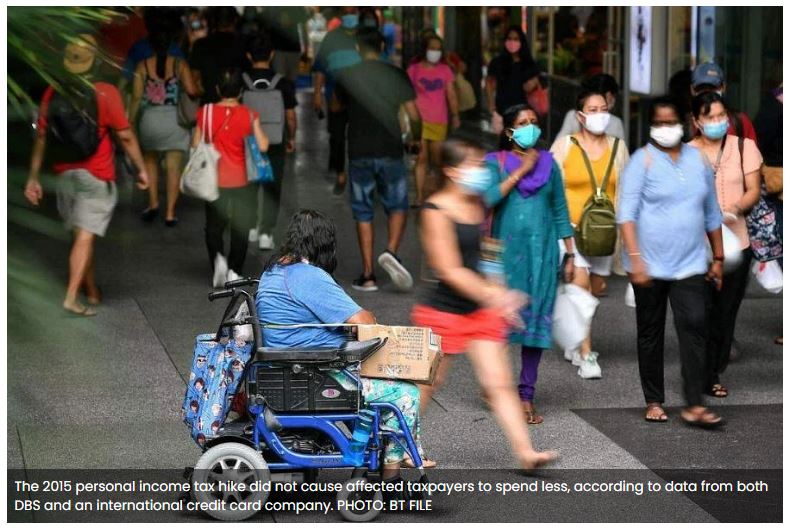Tax hike for top earners did not hurt spending, while handouts boosted consumption: Singapore study
A PERSONAL income tax hike for Singapore’s top earners did not cause them to spend less overall, while accompanying redistribution programmes did boost consumption by lower-income groups, a new study has found.
The paper, by researchers from the National University of Singapore (NUS), looked at the impact of a personal income tax hike for the top 5 per cent of earners, when marginal tax rates rose between one and two percentage points.
Announced in Budget 2015 but taking effect in March 2017, the tax hike was accompanied by measures for lower-income groups: enhancements to the GST Voucher and Workfare Income Supplement schemes, as well as the new Silver Support Scheme.
Based on data from both DBS and an international credit card company, the researchers found that the group affected by the higher taxes — those whose annual incomes exceeded S$160,000 — did not change their spending habits significantly, both after the new tax regime was announced and when it was implemented.
They compared this group with those earning between S$100,000 and S$160,000, who neither faced a tax hike, nor received payouts from the redistribution programmes.
Relative to the unaffected group, high-income earners increased their monthly credit card spending by 0.8 Singapore cents per extra tax dollar after the announcement, and 0.5 cents per extra tax dollar after the policy kicked in. Meanwhile, bank data showed that their spending decreased by a “negligible average of 0.1 cents per additional tax dollar”.
In both cases, the results were not significant, so no correlation could be established. In other words, it was possible that the tax hike had no impact on their spending.
In contrast, the researchers found that low-income earners — those earning below S$80,000 a year — increased their credit card expenditure by between S$15 and S$28 per month after Budget 2015, compared to the benchmark period of the first half of 2014. Unlike the tax hike, which was implemented in 2017, the redistribution programmes took effect soon after the announcement.
Within this group, those with annual income of S$20,000 to S$40,000 continued to have higher credit card spending of S$15 to S$30 per month after the tax hike took effect, relative to the same benchmark period.
“These findings suggest that while the tax increase does not directly affect the rich population, it has a positive redistribution effect, directly raising the lower-income groups’ consumption,” said the NUS Institute of Real Estate & Urban Studies in a blog post on the study.
About two-and-a-half years after the Budget 2015 announcement, and after discounting for the macroeconomic multiplier effect, the low-income group increased their consumption by S$3.8 million or S$1.5 million per year, accounting for 60 per cent of the additional taxes raised from the high-income earners.
The study was conducted by researchers Sumit Agarwal, Wenlan Qian, Bernard Yeung from the NUS Business School and Huanhuan Zheng from the Lee Kuan Yew School of Public Policy.
Source: https://www.businesstimes.com.sg/singapore/tax-hike-top-earners-did-not-hurt-spending-while-handouts-boosted-consumption-singapore


 Thailand
Thailand




